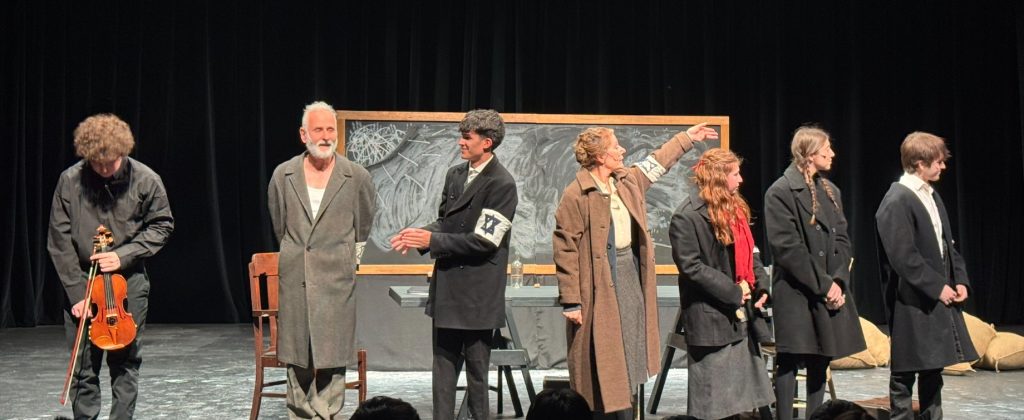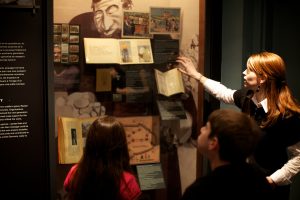A new stage production of The Children’s Republic is bringing a historically rooted message to Toronto audiences this week, one that feels increasingly relevant in a climate of rising antisemitism.
Running from May 14-16 at the Koffler Centre of the Arts, the play—written by award-winning Canadian playwright Hannah Moscovitch—tells the story of Dr. Janusz Korczak, a Jewish-Polish pediatrician and educator who ran an orphanage in the Warsaw Ghetto during the Holocaust. When the children in his care were deported to the Treblinka extermination camp, Korczak refused to abandon them, and instead accompanied them to their deaths.
Directed by Richard Rose, the production is a collaboration between professional actors and students from TanenbaumCHAT, a Jewish high school in Toronto. It’s staged in partnership with the Harold Green Jewish Theatre Company and the Koffler Centre of the Arts, and comes at a time when many educators are raising concerns about the state of Holocaust education in Canada.
The play unfolds within the walls of the orphanage, where Korczak and his longtime colleague Stefa Wilczynska attempt to shield their young residents from the horrors outside. Among the children are Misha, a boy seeking comfort in religious study; Mettye, a sharp-witted observer; Sara, a new arrival and violin prodigy struggling with grief; and Israel, a troubled youth prone to violence.
Minimalist in set design, mostly leaning on a chalkboard and a few chairs, the production uses narration to convey scenes of violence rather than depicting them outright, emphasizing memory and abstraction over spectacle. The characters write context in chalk, such as the date and number of Jews in Warsaw, giving the audience a visual window into their shifting inner worlds. A live violin score, performed by a student musician, enhances both the tenderness and tension on stage.

“To me this is a story of a great hero,” said Rose. “He [Dr. Janusz Korczak] could have gotten out. But he tries to give a moral education, a belief in humanity, and a sense of ethical, moral purpose.”
“My little cutline is, ‘He’s a humanist in inhumane times’,” Rose added. “I think we need to see these stories of humanist heroes.”
The student performers say they felt the gravity of the story they were helping to tell.
Gave Lichtman, who plays Misha, said he connected with his character’s moral struggle. “Misha is a character who suffers a lot, and he tries to find answers through the Torah… He wants to understand how the world can be the way it is, but he can’t find the answers that he’s looking for, so he’s constantly yearning for more.
“I feel like we all have a sense of curiosity, and we yearn to understand these times and how something like this could have happened,” he said.
For Neta Croitoru, a student sound designer, the project felt especially urgent. “Schools [in Canada] are doing a really bad job of teaching about Holocaust education,” she said. “Students don’t even know how many Jews died in the Holocaust… They don’t know what year it started or what year it ended.”
Croitoru first learned about Korczak in Grade 7. “He could have lived and told stories and become famous, but he decided to go to Treblinka with his kids because they meant the most to him.”
Ariel Goldberg, who plays Mettye, said the humanizing lens of the production was crucial. “There’s a lot of Holocaust denial… and I think it’s important to have a play like this, which centers on history,” she said. “When we think about the Holocaust and the dehumanization of the Jewish people, it’s important that the art we create surrounding the Holocaust does not do the same.”
Goldberg said art allows victims and survivors to “maintain their dignity.”
Amy Sager, who plays Sara, reflected on the emotional intimacy of the characters. “They’re just normal kids going through this,” she said. “In a time where everything is getting destroyed… people can still build connections.”
Yoav Aviram, who portrays the troubled orphan Israel, emphasized the production’s relevance for today’s youth. “It’s really important to bring non-Jewish kids or even Jewish kids who just don’t have the right perspective… to come to this play,” he said. “It allows them to resonate or understand and have a clearer perspective of what happened.”
Goldberg added that the storytelling style allows modern audiences to bridge the distance of time. “We can’t comprehend it, but we have a better sense of understanding than we did before by just hearing it,” she said.
Throughout the rehearsal process, Rose treated the students as professionals. “My process is exactly what I do professionally… building up what’s happening in the scene and trying to stay true against the writing and the physicality and the environment,” he said. “Part of directing is teaching… but I didn’t teach them like I’m teaching acting students. I thought, well, you’re going to have to act like the pros… and that’s what their response has been—they have responded like professionals.”
Music plays a central role in the show. Student violinist Morrison Brill, who performs live throughout the production, reflected on the complicated legacy of music during the Holocaust. “There were young musicians who were brought to concentration camps during the Holocaust, and the only reason they survived was because they had the instruments and they were able to play while imprisoned,” he said.
“It’s good because they survived, but it’s also like a very complicated and traumatizing thing… they were knowingly giving them a false sense of hope.
“I think that music has had a very profound effect on the Holocaust, and is very complicated, and the only way we can move on with music is to continue to spread it.”
The project was co-produced by Sydney Bernknopf and Lori Fahidi, both teachers at TanenbaumCHAT, and Sebastian Biasucci, a producer with the Harold Green Jewish Theatre. Both Bernknopf and Biasucci said the production’s message has only grown more urgent in recent months.
“Especially since October 7th, there’s been so much misinformation, so much hate towards this community, and it’s been traumatizing, honestly,” said Bernknopf. “Even in the darkest of times in the world crumbling around you, there is still humanity, there is still hope, there is still dignity to cling on to.”
Biasucci noted that the team partnered with the Toronto District School Board, Toronto Catholic District School Board, and several private schools to ensure students could attend the show at no cost. “We’ve also had local retirement residences and seniors coming out and seeing the show,” he added. “It’s been very beautiful to see audiences of all ages seeing it together.”
Biasucci noted that the reception has been positive, with performances receiving standing ovations.
Bernknopf says the play, “at its core, is about empowering children.”
“That was the mission statement: through art, with so much empathy, to convey this story and this message to students. And maybe that will be some sort of light—not just for Jewish kids, but for non-Jewish kids too.”
Correction: A previous version of this story incorrectly identified Sebastian Biasucci. The CJN regrets the error.
Author

Mitch is The CJN's campus and education reporter based in Toronto, Ont. He has a passion for investigative research, long-form feature writing and digital journalism. His book, Home Safe, was published by Dundurn Press in November 2022.
View all posts








